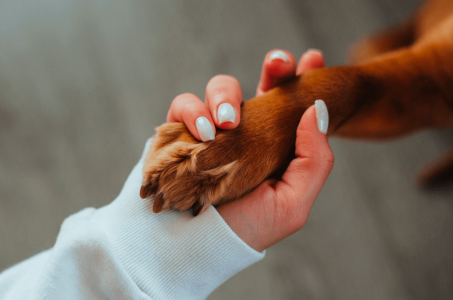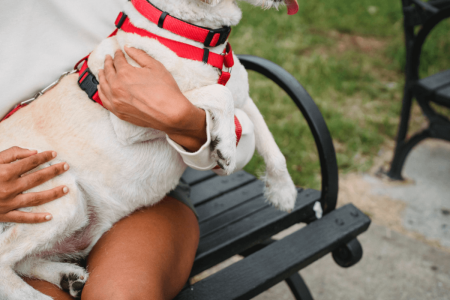Single mum 'saddened' and 'insulted' after being denied service in a local barbershop - all because of her guide dog
- Replies 11
Navigating the world can be an unbearable task for those who are underprivileged and/or disabled, especially those who rely on guide dogs to assist them. They often face a multitude of obstacles that can make even the simplest of tasks, such as getting a haircut or running errands, impossible to accomplish.
The lack of accessibility and understanding in the environment, coupled with societal prejudices and biases, can make it a constant battle for them to enjoy the most basic privileges and necessities that others take for granted.
The news of Marilena Osborne's experience left us feeling heartbroken. Marilena is a single mother with low vision who relies on her beloved guide dog Hamilton to navigate the world.
But when they went to a barber in Jannali, NSW, they were met with a cruel and insensitive response. The store's employees were scared of Hamilton and refused to let them in, leaving Marilena feeling humiliated and rejected.
Marilena's words about the incident speak to the deep emotional pain she felt. She told a news source that she was 'deeply shocked, saddened and insulted'. And she felt they were treated as 'second-rate citizens'.

Barbershop employees cited their fear of dogs as the reason for denying service to Marilena and her guide dog. They claimed that they 'have dogs outside' and even brought up a past incident where a staff member's leg was allegedly bitten by one.
However, Marilena insists that this has never happened with Hamilton before, who is specially trained to assist her and is known for being calm and quiet when working.
'There is nothing scary about this dog,' she said. 'He has been specially trained to just guide me around the place.'
It's important to note that guide dogs are specially trained to assist individuals with disabilities and have a calm and well-behaved demeanour. They are not just pets but working animals that have passed rigorous training and certification programs.
In this case, it seems that the barbershop's employees were not familiar with the role and behaviour of guide dogs, leading to the unfair treatment of Marilena and Hamilton.

It's a shocking reality that individuals with guide dogs in Australia continue to face discrimination and denial of access to public places, despite it being illegal under The Commonwealth Disability Discrimination Act 1992.
According to Guide Dogs Australia, more than a third of guide dog handlers reported being denied access to a public venue or form of transport because of their guide dog in the past year. Not only is this a violation of their rights, but it also leaves them feeling unsafe and in danger.
Guide Dogs Australia has stressed that this is an ongoing issue for many guide dog handlers and that refusals continue to happen.
It's worth noting that in all states and territories across Australia, a guide dog in harness with their handler is legally allowed to enter all public places, including public transport and taxi/ride-shares, and it's an offence to deny or charge a fee for the entry of a guide dog.
The community generally does the right thing but it's crucial for everyone to rethink the implications of denying access to a guide dog handler as it goes against the freedom and independence a guide dog is meant to bring into someone's life.
Marilena Osborne has reported the incident to the police, and the matter is under investigation.


Members, if you're ever in a similar situation, please know that you have rights that you can exercise with the help of local, state and even federal laws.
You can contact your state or territory's Department of Fair Trading or Office of Fair Trading as they provide information on rights and responsibilities of guide dog handlers and business owners, and can also assist in lodging a complaint or making an enquiry.
Remember that accessibility and inclusion are human rights issues, which means that we all have a responsibility to speak up and stand against any form of unwarranted discrimination.
What are your thoughts on this story? Let us know in the comments.
The lack of accessibility and understanding in the environment, coupled with societal prejudices and biases, can make it a constant battle for them to enjoy the most basic privileges and necessities that others take for granted.
The news of Marilena Osborne's experience left us feeling heartbroken. Marilena is a single mother with low vision who relies on her beloved guide dog Hamilton to navigate the world.
But when they went to a barber in Jannali, NSW, they were met with a cruel and insensitive response. The store's employees were scared of Hamilton and refused to let them in, leaving Marilena feeling humiliated and rejected.
Marilena's words about the incident speak to the deep emotional pain she felt. She told a news source that she was 'deeply shocked, saddened and insulted'. And she felt they were treated as 'second-rate citizens'.

Marilena was denied service in a barber because of her guide dog Hamilton. Credit: Pexels/Meruyert Gonullu.
Barbershop employees cited their fear of dogs as the reason for denying service to Marilena and her guide dog. They claimed that they 'have dogs outside' and even brought up a past incident where a staff member's leg was allegedly bitten by one.
However, Marilena insists that this has never happened with Hamilton before, who is specially trained to assist her and is known for being calm and quiet when working.
'There is nothing scary about this dog,' she said. 'He has been specially trained to just guide me around the place.'
It's important to note that guide dogs are specially trained to assist individuals with disabilities and have a calm and well-behaved demeanour. They are not just pets but working animals that have passed rigorous training and certification programs.
In this case, it seems that the barbershop's employees were not familiar with the role and behaviour of guide dogs, leading to the unfair treatment of Marilena and Hamilton.

Osborne's experience of being treated differently because of her guide dog is not an isolated one. Credit: Pexels/Ivan Babydov.
It's a shocking reality that individuals with guide dogs in Australia continue to face discrimination and denial of access to public places, despite it being illegal under The Commonwealth Disability Discrimination Act 1992.
According to Guide Dogs Australia, more than a third of guide dog handlers reported being denied access to a public venue or form of transport because of their guide dog in the past year. Not only is this a violation of their rights, but it also leaves them feeling unsafe and in danger.
Guide Dogs Australia has stressed that this is an ongoing issue for many guide dog handlers and that refusals continue to happen.
It's worth noting that in all states and territories across Australia, a guide dog in harness with their handler is legally allowed to enter all public places, including public transport and taxi/ride-shares, and it's an offence to deny or charge a fee for the entry of a guide dog.
The community generally does the right thing but it's crucial for everyone to rethink the implications of denying access to a guide dog handler as it goes against the freedom and independence a guide dog is meant to bring into someone's life.
Marilena Osborne has reported the incident to the police, and the matter is under investigation.
Key Takeaways
- Marilena Osborne, who has 'very low' vision and relies on her guide dog Hamilton, was refused entry when trying to enter a barbershop in Jannali.
- Barbershop employees said they were scared of the dog.
- Osborne explained that Hamilton is 'very calm and quiet when he is working'.
- Under The Commonwealth Disability Discrimination Act 1992, it is unlawful to refuse access to people with Guide Dogs and more than a third of Guide Dog handlers reported being denied access to a public venue or form of transport because of their Guide Dogs.

A guide dog in harness with their handler is legally allowed to enter all public places. Credit: Pexels/Samson Katt.
Members, if you're ever in a similar situation, please know that you have rights that you can exercise with the help of local, state and even federal laws.
You can contact your state or territory's Department of Fair Trading or Office of Fair Trading as they provide information on rights and responsibilities of guide dog handlers and business owners, and can also assist in lodging a complaint or making an enquiry.
Remember that accessibility and inclusion are human rights issues, which means that we all have a responsibility to speak up and stand against any form of unwarranted discrimination.
What are your thoughts on this story? Let us know in the comments.







